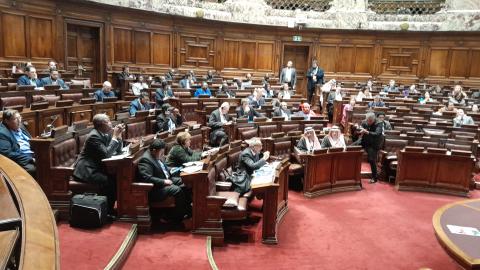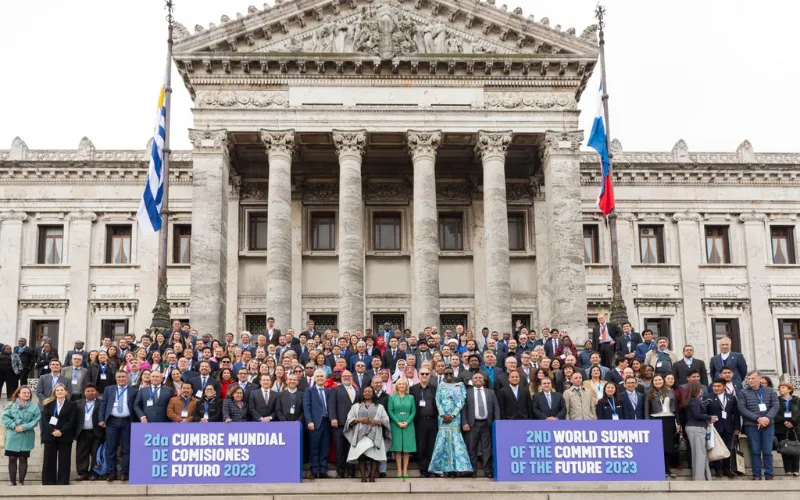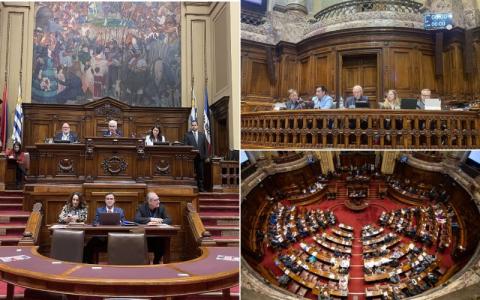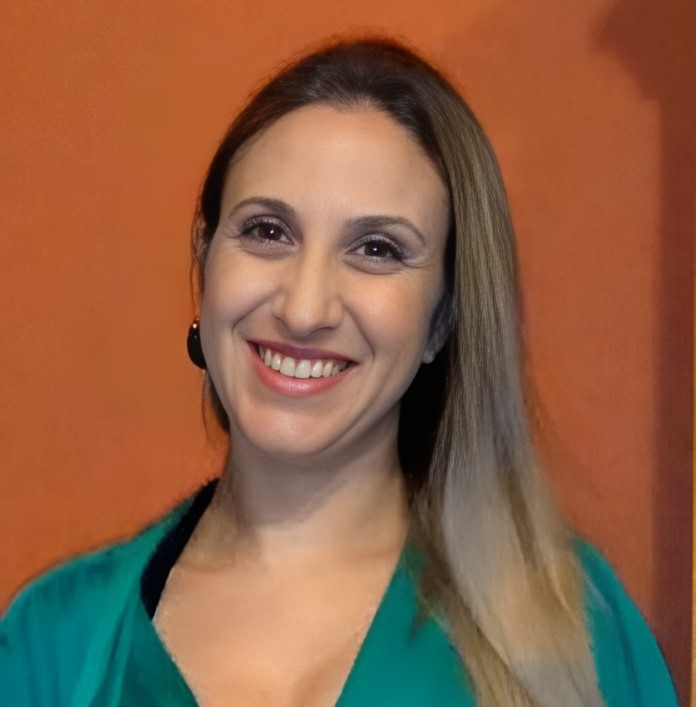
Concludes the II World Summit of the Committees of the Future

The world is changing at non-precedent speed, and democracy is challenged to accompany these changes in a responsible and innovative way. Parliaments have a critical role to play in this framework, and anticipatory parliamentary practice could be one of the key tools to face the challenge.
Several political ecosystems around the world are taking notice of this, and, as a result, more than 200 parliamentarians from 70 countries participated last week at the Second World Summit of the Committees of the Future in Montevideo-Uruguay (25 to 27 September 2023). The Summit built upon the first World Summit held in Helsinki in October 2022, which recognized the fundamental importance of incorporating the future in present decision-making to tackle disruptive trends and integrate a future-oriented approach to present-day policy and legislation.
The Parliament of Uruguay, with the support and collaboration of the International Institute for Democracy and Electoral Assistance (International IDEA), hosted this Summit under the umbrella of “Bringing the Future to the Present: The Democracy of the Future, Artificial Intelligence and Parliaments”. The objective was to foster collaboration, knowledge sharing and the development of new skills and capabilities for the “use of the future” in the present for more accurate decision-making. In particular, the invitation was to explore the interaction between present day parliaments, the future of democracy and artificial intelligence (AI).

In this framework, among the distinguished speakers of the event, Kevin Casas-Zamora (virtually) and Daniel Zovatto (in person) were part of a high-level panel where the potential impact of AI on democracy and legislation was discussed. In his participation. The Secretary-General of International IDEA, Casas-Zamora, highlighted that Uruguay joined IDEA as a member in 2003, contributing with its experience to the joint efforts in electoral processes, political participation and representation. Being able to work with the Parliament of Uruguay recently to foster its capabilities in anticipatory governance is a milestone in this mutually positive relationship, and the Summit is a key outcome for both parties. He also put over the table the relevance of analyzing the impacts of artificial intelligence not only on parliamentary work but on democracies and their sustainability and the need to legislate responsibly.
In this regard, Dr. Zovatto mentioned in his speech that we are facing the most profound and disruptive technological change ever known and we do not know the exact speed of the progress of AI, the existing or not limits for its growth and how to control the transition between AGI (Artificial General Intelligence) and superintelligence. The time framework of this transition has been getting shorter recently and needs to be addressed more in-depth with a global agreement to avoid an existential risk.
Dr. Daniel Innerarity, one of the experts funded by the EU and International IDEA cooperation project in Uruguay, was the keynote speaker at this panel presenting his theory of the complex democracy and the epistemic impossibility of artificial intelligence to take over democracy. He stated that technological fragmentation is not enabling the co-governance needed to address AI responsibly and that the logic of hegemony clashes with the current fragmentation. Thinking about future scenarios, truly effective global governance is the strategic beacon that humanity must pursue today with all its energy, in Innerarity´s view.

During the intense 2-day Summit, parliamentarians, experts, representatives from leading artificial intelligence development companies, civil society stakeholders and influential international organizations participated in plenary sessions, round tables and workshops. INTER PARES | Parliaments in Partnership EU Global Project to Strengthen the Capacity of Parliaments enabled the participation of parliamentarians from Africa, Asia Pacific and East Europe in these activities, enabling them to present their views and to have knowledge exchange experiences with their peers.
The final declaration of the Summit is a key input for the UN Summit of the Future to be held next year and summarizes the main topics discussed and agreed upon in this historic turning-point framework: “We call upon the United Nations to spotlight the centrality of anticipation and foresight in Parliaments through their main functions: accountability and oversight, legislative and representative in addressing the multifaceted challenges and opportunities posed by AI.”
It states the commitment to democracy in the age of AI through anticipatory governance and its potential to ensure beneficial AI outcomes for societies, advocating for a balanced approach to AI regulation, harmonizing the need for innovation with ethical considerations: “For Parliaments to play their role, they need to build their understanding, knowledge, and ability to integrate future-oriented methodologies and approaches in their work across the board.“ The parliamentary mandate and forward-looking initiatives of governments are the keys to long-term sustainability. Well-informed citizens and public engagement are also vital to ensure the effective future-oriented work of parliaments.




